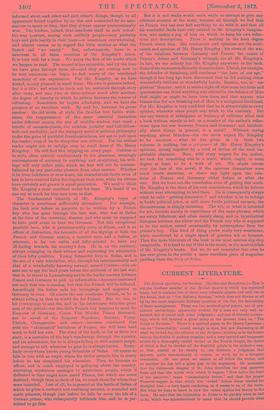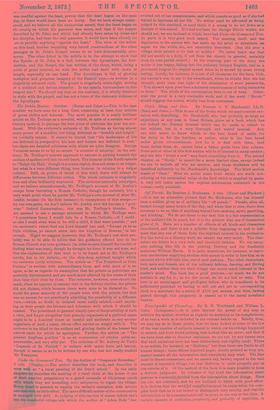CURRENT LITERATURE.
The British Quarterly, for October. (Hodder and Stoughton.)—This is not the liveliest number of the British Quarterly which has appeared lately, but it contains two or three very valuable papers, and only one of dry detail, that on "Our Railway System," which does not discuss at all by far the most important Railway question of the day, the desirability of State management- There are two archeological papers, one of pre- historic archeology, apparently written by a man not only well in- formed, but of sound and sober judgment; and one of historic archaeo- logy, which will interest a great many at the present time, on "The Gotha at Ravenna." There is a spirited paper on Sir Henry Lawrence ; one on "Immortality," sound enough in view, but not discussing at all what we looked for, the relation of the Scripture teaching as to the future state to the doubts of modern sceptics ; and a very learned and temperate article by a thoroughly candid writer on the Fourth Gospel, the defect of which is that he decides all the doubtful points in the orthodox way, so that candid as he clearly is, one distrusts a jadgment that appears, quite unconsciously of course, to work up to a foregone conclusion. On one point we cannot at all follow the writer, and on another he has left a great gap in his argument. He maintains that the thirteenth chapter of St. John describes the real passover feast, and that the words with which it begins, "Now before the feast of the paasover," mean "immediately before," and that the proper Passover supper is that which was " ended" before Jesus washed his disciples' feet, —a very harsh rendering, as it seems to us, of the verse. But what we want to know is how the writer applies his theory to the facts. He says that the injunction to Judas to do quickly what he had to do, which was misunderstood to mean that he should provide what was needful against the feast, proves that the feast began on the next day, or there would have been no harry. But we have always under- stood, and we believe all the authorities assert, that the feast began on he evening on which the passover was eaten, and that if the sapper described by St. John, and which had already been eaten by Jesus and his disciples, had been the real passover, it would have been already too ate to provide anything "against the feast." The view of the writer on this head, besides requiring very forced constructions of the other passages in St. John's Gospel, seems to us here demonstrably erro- neous. The other defect in the article is in the attempt to show that the Epistle of St. John is a link between the Apocalypse, the first- written, and the Gospel, the last written of the three, which, being a point of great interest, we wish the writer had dealt with more at length, especially on one head. The Apocalypse is full of glowing metaphor and gorgeous imagery of the Ezekiel type,—is written in a singularly coloured style. The gospel is singularly white-light writing of a subdued and devout intensity. Is the epistle, intermediate in this respect also ? We should say that on the contrary, it is wholly identical in style with the gospel, and has not a trace of the visionary richness of the Apocalypse.



































 Previous page
Previous page